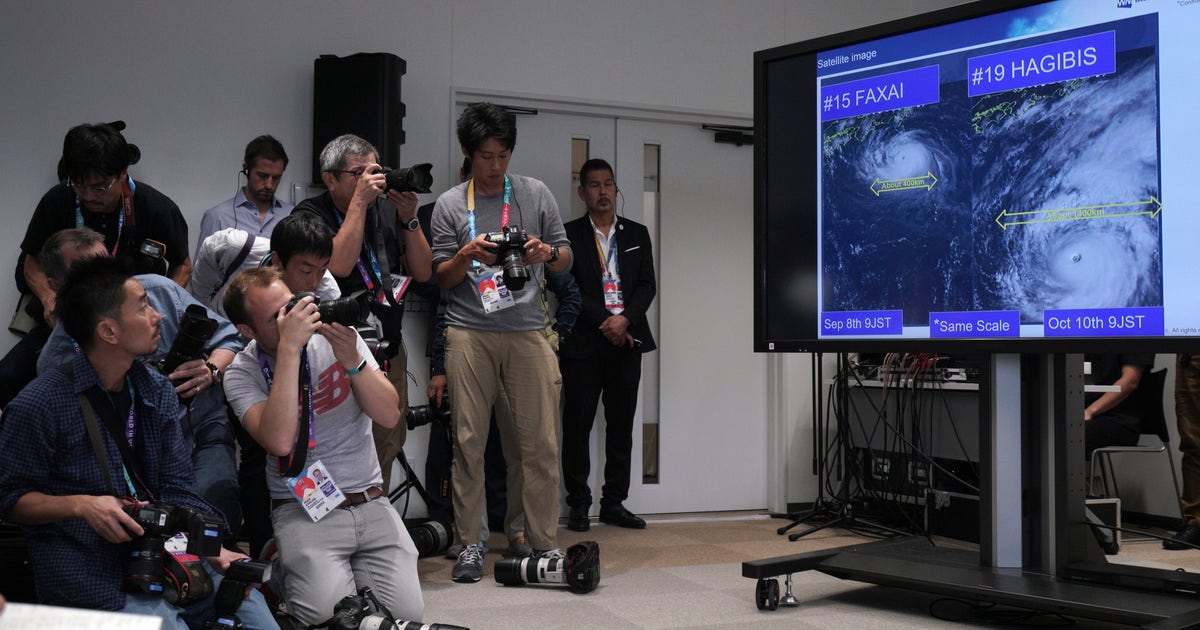Tough guys: Rugby players not flustered by massive typhoon


OSAKA, Japan (AP) — Rugby players don’t scare easily. Not even when there’s a super typhoon heading for them.
Some of sport’s toughest guys are waiting for the arrival of Typhoon Hagibis, which is bearing down on Japan and its ongoing Rugby World Cup and set to arrive during a weekend of crucial games.
Two matches have been canceled on Saturday, the day the typhoon is expected to hit hardest. And the teams have been told by organizers to stay indoors at their hotels and out of the way of the torrential rain and destructive winds that are expected to hammer Japan’s main island.
“I’ve never been in a typhoon before,” said Sam Whitelock, the bearded, 6-foot-8 New Zealand forward.
If you think Whitelock sounded curious, at best, at the impending arrival of a violent cyclone, wait for South Africa coach Rassie Erasmus, himself a former player:
“Personally, I’ve never been a part of something like this. And it’s interesting,” Erasmus said.
Interesting?
Whitelock comes from the city of Palmerston North on New Zealand’s North Island. Erasmus is from a small town in South Africa’s rural Eastern Cape province. Neither of those places have typhoon seasons, hence the two of them being intrigued at the thought of a typhoon.
But Japan does have a typhoon season and Hagibis and its 250 kilometer-per-hour winds is the 19th of this season for a region utterly acclimatized to severe meteorology. Japan has about 1,500 earthquakes a year, a rough average of four a day. And also more than two dozen of these typhoons blow through this part of the Pacific. Maybe three or four of them hit Japan’s mainland each year.
“It’s not something we can control so I don’t care about it at all,” said Japan player Keita Inagaki.
Inagaki’s biggest concern of the weekend, he said, was choosing the right boots to wear on Sunday when Japan plays Scotland in a massive game for the host country. If Japan wins, it is into the quarterfinals of the Rugby World Cup for the first time, the first Asian team to do that.
Inagaki’s preparations for the typhoon and its aftermath: “The turf might be wet so I’ll take a couple of pairs of boots with different lengths of studs,” he said.
Rugby players, hey?
Inagaki’s teammate, Shota Horie, was confident his country would ride out the typhoon and be able to set up the stadium in Yokohama, near Tokyo, in time for the big game against Scotland on Sunday night, when Hagibis is expected to have moved on.
“I think the match will go ahead, (and) of course we’ll win and progress to the last eight,” he said. “I’m not thinking about anything else.”
And then, finally, an inkling of uneasiness.
“I’m worried whether my house will be alright,” Horie added.
Generally, the players are getting on with it at the Rugby World Cup.
The teams will train indoors on Saturday, for example, because there’s really no other option is there? New Zealand’s players, the defending champions, had a full-on, full-contact practice match among themselves — bashing up each other instead of another team — because their game against Italy was one of the two to be canceled on Saturday.
Actually, there was one rugby player who had a little cry because of the typhoon. Veteran Italy front-row forward Leonardo Ghiraldini shed tears when he learned the Italy-New Zealand game in Toyota was off. But it was to be his farewell game before retiring and the only reason Ghiraldini was really upset was because he was denied one last chance to thump a couple of New Zealanders in a few scrums and tackles after 13 years and 104 games of thumping players from all over the world.
Rugby World Cup organizers were criticized for canceling the two Saturday games — New Zealand vs. Italy and England vs. France — and having no backup plan to play them on a different day or at a different venue. It denied Italy a very slim chance of going through to the quarterfinals. Sunday’s matches could still be canceled, too, if Hagibis hangs around or causes significant damage.
But the organizers had little option considering the serious logistical difficulties of moving games — and countless players, coaching staff and officials — in a tight schedule.
Bar Italy’s disappointment and Scotland’s complaints about the potential to cancel their game, the teams have all understood. And just got on with it, with marvelous understatement at times.
Tonga coach Toutai Kefu, a big former backrower who won the 1999 World Cup with Australia, was also asked about the effects of the passing typhoon on his team’s game against the United States in Osaka on Sunday, with up to 80 centimeters (30 inches) of rain expected in some parts of Japan before Hagibis moves on.
“It’s obviously going to be a wet game,” Kefu said.






